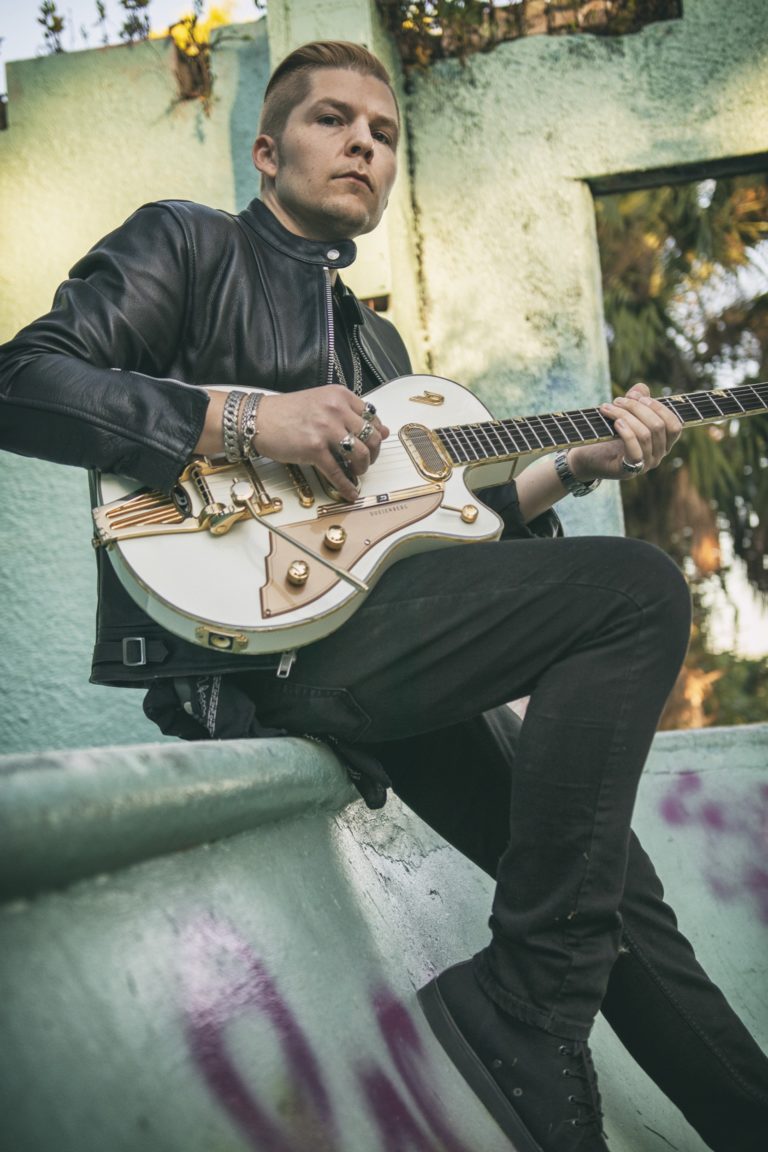In the midst of creating The Deep and the Dirty, Eric Johanson’s previous album cracked the Top 10 on the Billboard blues chart. It was his fourth time reaching the Top 10. And for a Louisiana native who’d grown up idolizing bluesmen like Freddie King and Robert Johnson, it felt pretty good. Even so, genre success didn’t discourage Johanson from reaching beyond the blues for The Deep and the Dirty’s eclectic, electrifying songs.
“I’ve never tried to stay within one box,” he says. “Blues is at the root of the different styles of music I play — hard rock, Americana, New Orleans funk, country — but I don’t see the lines between genres, and I’m not following a standard form. What I find important about the blues is the rawness of it. The expression of it. The humanness of it. That’s what makes The Deep and the Dirty a blues album: the raw self-expression.”
Produced by Jesse Dayton (Supersuckers, Rob Zombie) — another roots-rock innovator who, like Johanson, uses the blues as a springboard for a bigger, broader sound — The Deep and the Dirty (whose title refers to the American South) fires twin barrels of sharp songwriting and fiery fretwork. Johanson wrote these songs during an era that found him at home, live-streaming acoustic performances and releasing two volumes of his Covered Tracks series to a quarantined world. At the earliest opportunity, Eric returned to the road, gaining a fresh appreciation for the musical chemistry generated by a well-oiled touring band. The Deep and the Dirty captures these contradictions and subtleties with songs infused with messages about embracing the modern moment recorded in the studio as a band playing together live.
Bassist Eric Vogel (Big Sam’s Funky Nation / Fred Wesley) and Grammy-winning drummer Terence Higgins (Ani DiFranco / Warren Haynes / Tab Benoit) joined him in the studio, recording 12 songs in two days. “When you’re playing this kind of music together, you create moments that can’t be replicated if you’re recording each part separately,” Johanson explains. “I don’t write my guitar solos beforehand, and I don’t record them separately, either. I need to interact with the band in order to take the solo somewhere special, and that’s why it’s important for us to record live. Even if there’s a mistake or two, it feels like an honest representation of the moment.”
Johanson has been capturing moments for years. Born in Alexandria, Louisiana, he received his first guitar at five and became a self-taught prodigy. By his teens, he was a staple at regional blues gigs, often joining much older musicians on stage from New Orleans to Memphis’ Beale Street. Meanwhile, his tastes expanded to include rock acts like Tool, Soundgarden, and Nine Inch Nails. Next, Johanson began making his songs, experimenting with everything from rock & roll to beat-driven electronic music. Living in New Zealand for four years broadened his horizons even further. And by the time Johanson resettled in New Orleans during the 2010s, he’d developed a style of music that unapologetically encompassed all his influences. Solo albums like 2017’s Burn It Down introduced that sound to a larger audience, while sideman work for acts like Cyril Neville (The Neville Brothers) kept his guitar chops sharp.
“Music is a way for me to try and make sense of my world and myself,” he says. “The Deep and the Dirty is an evolution of what I’ve done before — a little more in your face, a little more up-tempo, and a little more rocking. I came out of the slow years with a lot of energy, wanting to blast off.”
Songs like “Don’t Hold Back” encapsulate the album’s “seize-the-day” message. Anchored by fuzz guitar and a stomping groove, the song finds Johanson reveling in the present. “This moment right now; this is all we get,” he sings, his vocal delivery as compelling as his guitar work. “Just Like New” explores similar themes, with Johanson trading the overdriven crunch of his electric guitar for the Delta dirt of a metal-bodied National Resonator. Elsewhere, The Deep and the Dirty offers everything from roadhouse roots-rock (“Undertow”) to dark, bluesy Americana (“Familiar Sound”); it’s diverse sound glued together by a musician who’s never been afraid of the grey area between traditional genres.
“Traveling the country and playing for different audiences over the years, I’ve learned that people respond to honest music, even if it’s not in a standard blues format,” he says. “That realization has freed me up to do whatever sounds natural. I love listening to old blues and country, but I also love hard rock. I love playing guitar and improvising onstage, but I also love writing songs that tap into a feeling. This album became a natural mix of all the things I’m into. I’ve found a way to bring everything together.”
Photo: Kaylie McCarthy

